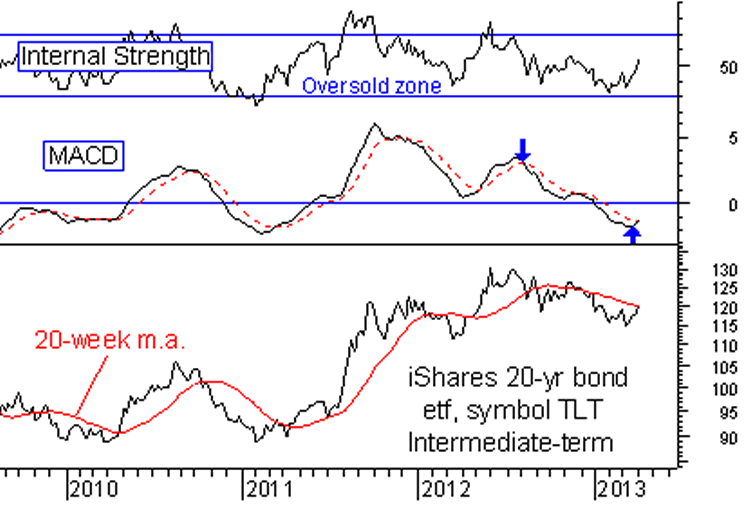Forget About The Fed Dialing Back QE3 – U.S. Buy Bonds!
Interest-Rates / US Bonds Apr 06, 2013 - 12:42 PM GMTBy: Sy_Harding
 The economic recovery has been progressing so well that it had become almost a sure thing the Fed will begin phasing out its easy money policy and QE stimulus programs much earlier than planned, possibly beginning as early as this summer.
The economic recovery has been progressing so well that it had become almost a sure thing the Fed will begin phasing out its easy money policy and QE stimulus programs much earlier than planned, possibly beginning as early as this summer.
Even the Fed seems to be preparing markets for that probability with its recent statements, and speeches by individual Fed governors.
Forget about it!
There were already enough nails in the recovery’s tires to run it off the road without Friday’s report that only 88,000 jobs were created in March. As I said in last week’s column, the economy and stock market were already at their most critical point since the peak in 2007.
Previous reports included that new home sales unexpectedly fell 4.6% in February, the biggest monthly decline in two years. Pending home sales declined 0.4%. Basic durable goods orders (ex-volatile aircraft orders) declined 2.7% in February. The Conference Board’s Consumer Confidence Index fell sharply in March. The ISM Mfg Index dropped sharply from 54.2 in February to 51.3 in March. The ISM Non-Mfg Index (service sector) plunged from 57.2 in February to 53.3 in March.
FedEx and Caterpillar, bellwethers for global economic strength, both warned of significantly slowing global sales, Caterpillar reporting its Asia-Pacific sales plunged 26%, and North American sales fell 12% from December through February.
And now Friday’s employment report shows only 88,000 jobs were created in March, horribly worse than the consensus forecast for 200,000 jobs being created.
Don’t panic. This is not something we haven’t seen before. The economic recovery has stumbled in each of the last three summers, raising fears of a slide back into recession. And each time the Fed came to the rescue with another round of QE type bond-buying stimulus.
But we do have to wonder what the Fed can do about it this time.
In each of the last three years when the recovery stumbled the Fed’s previous QE stimulus programs had expired, and it simply introduced a new program (QE2, ‘Operation Twist’, and QE3) each time, and the economy recovered.
But this time the economy is slowing even though the Fed’s QE3 did not expire. In fact in December the Fed introduced QE4 or ‘QE to infinity’ as some call it, raising its monthly asset-buying (bonds and real-estate-backed securities) from $40 billion to $85 billion and made it open-ended, with no expiration date, promising to keep it going until there are clear signs that the economy has recovered and can make it on its own.
So what can the Fed do this time? It is a worry.
One thing it can’t do is think about reversing its current stimulus programs any time soon as it had hoped.
The bond market has begun to realize that. Bonds have been in a fairly significant correction since last summer, on expectation that the recovering economy would allow the Fed to begin removing the stimulus punch bowl and raising interest rates. The iShares 20-year bond etf TLT declined 13% from its peak last summer to its low last month.
But, with the awful economic reports of late Fed tightening any time soon is not in the cards, and bonds are realizing that, recovering their appeal as a safe haven.
Even before the ugly jobs report our technical indicators had already triggered a new intermediate-term buy signal on bonds from oversold levels.

The next question will be whether the stock market will have similar concerns about the economy. It was pretty much able to ignore the string of previous negative economic reports, with the Dow and S&P 500 closing at new record highs on Tuesday. But will the jobs report be the final straw?
Sy Harding is president of Asset Management Research Corp., and editor of the free market blog Street Smart Post.
© 2013 Copyright Sy Harding- All Rights Reserved
Disclaimer: The above is a matter of opinion provided for general information purposes only and is not intended as investment advice. Information and analysis above are derived from sources and utilising methods believed to be reliable, but we cannot accept responsibility for any losses you may incur as a result of this analysis. Individuals should consult with their personal financial advisors.
Sy Harding Archive |
© 2005-2022 http://www.MarketOracle.co.uk - The Market Oracle is a FREE Daily Financial Markets Analysis & Forecasting online publication.



